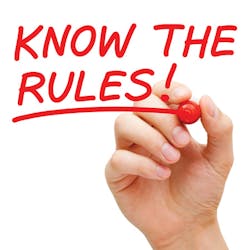How to lose your license: Tracking program facilitates monitoring of required continuing education
By Dee Humphrey, RDH, BHSc
It is a well-known fact in the dental hygiene profession that continuing education is a prerequisite for renewal of license registration. But are we informed about how to legally retain our license?
I recently attended a conference for dental hygienists to not only further my knowledge, but also to maintain my license. Upon taking courses and talking with others, I came across some profound information pertaining to how a hygienist can lose his or her license. My ears immediately perked up and I wanted to know if I was at risk.
When I heard, "How many RDHs actually read their state board rules and regulations?" I was the first to admit I read it about six years ago to pass my jurisprudence, and that was as far as it went. As a new grad, I could barely spell jurisprudence, let alone understand everything about it. I made a call to my local state board and was informed that as long as I was getting 30 CE credits within a certain timeframe, I should be fine. Or so I thought!
I recently learned a valuable lesson from two very intelligent hygienists, Sarah Thiel and Katrinna Jackson, cofounders of CE Zoom. According to their CE tracking program, not all states accept the same amount of specialized classes, and not all continuing education courses count toward our licenses. This information shocked me because I thought that all continuing education courses were magically recognized. Boy, was I wrong, and yes, I'm gullible. Everyone should be informed regarding what certified courses count toward our professional license while obeying the state law at all costs (literally). After all, do you want to get audited and lose your professional license that you worked so hard to get due to lack of knowledge? I know I don't.
Sarah and Katrinna advised me to do this-go to the CE Zoom website and create an account. It's free, which is a nice bonus considering I'd already spent a small fortune on many CE classes and conferences. I provided my personal information and licensing state into the program. This brought up a dashboard that took me to the requirement overview page to view my state's requirements. The link to my state dental board was also provided, which helped me determine if I was compliant with the law. A complete outline of subgroups showed the categories where I could upload my certificates and explained in detail what courses fit into the locations for my state license. A progress indicator tool specified how much input was needed. Here are the results that I found.
I had taken over 65 hours of CE courses, and nearly 30 of those did not count toward my license renewal. This caused me serious heart palpitations because I thought I was done for this reporting period. I immediately panicked and looked back to the year I graduated to see if I had broken any laws. Thankfully, I hadn't. Whew!
Sarah and Katrinna also taught me how to make sure the courses I take are certified by a recognized entity, such as the Academy of General Dentistry (AGD), Program Approval for Continuing Education (PACE), associated, affiliated, sponsored, approved, or accredited courses offered by the American Dental Association or the American Dental Hygienists' Association, and more. You see, anyone can put a CE course together and speak on various subjects, but the ones who are "recognized providers" offer what legally counts. Make sure to take only certified classes that matter and don't waste time when there's a license at stake.
In Oklahoma, only three hours of dental practice management courses count legally toward my license. This means that all the courses I took about practice management, being a better team player, and learning how to speak or write on a professional level were just for the fun of it! Over 50 hours were volunteered to various nonprofit organizations during these last two years of reporting, but only five hours actually counted.
As I researched more into the CE Zoom program about my state board rules and regulations, I found out that courses directly related to the provision of services and patient care need to account for 50% of my continuing education. An ethics course and CPR certificate are a must to maintain my licensure, but this is not always the case in other states. Failure to report CE hours in my state results in a fine of $500, and if it's not paid, the permit is not issued, which means no license.
You still have to make up the classes within an allocated timeframe to avoid another penalty. My state's rules and regulations state that the board conducts random audits to make sure the required documentation matches the information submitted. This is no laughing matter. These findings scared me because the reporting period for my state is right around the corner. Do I have enough hours? Will I get audited? Could I lose my license? If a random audit is conducted by your local state board, are you at risk of losing your license?
Most hygienists do not want to comb through wordy jurisprudence booklets, and who can understand them anyway? Yet it is solely our responsibility as dental hygienists to keep up with and report the appropriate amount of courses during the time allocated by each state. We can't blame anyone for our lack of knowledge. CE Zoom is user friendly and it's easy to upload all certificates into one location, even for past years.
This program helps users find upcoming conferences and courses, as well as area meetings. I had no idea about the conferences available near my hometown, and all I had to do was click on the upcoming-courses link. Webinars are offered and attendees can even register for conferences through CE Zoom's automated system. How amazing is that? The calendar and expense tracker are great tools to help keep users organized.
Surveys, managing CEs, and a transcript of all items submitted make this program a must for all dental hygienists. Thank you, CE Zoom, for helping this clueless hygienist keep her professional license and helping me stay legal. Check out CE Zoom for yourself, and get to know your state rules and regulations. You won't be sorry! RDH
Dee Humphrey, RDH, BHSc, is a prevention specialist clinical hygienist who provides preventive care and treatment services at a community dental clinic in Jay, Oklahoma. She speaks at many public schools about tobacco prevention and other topics within a tristate area. She earned her RDH and bachelor of science at Missouri Southern State University in Joplin, Missouri.







